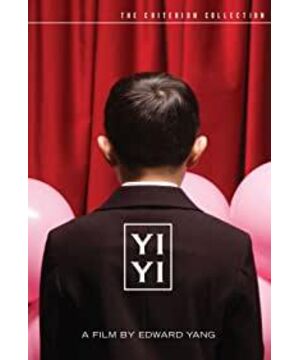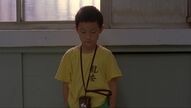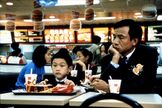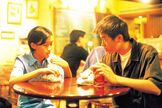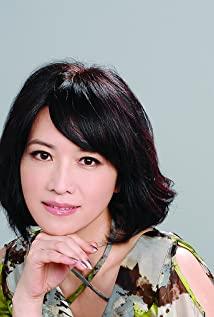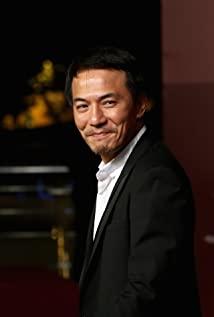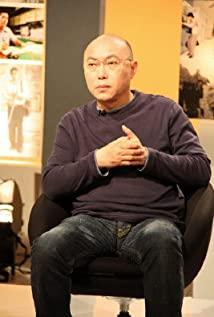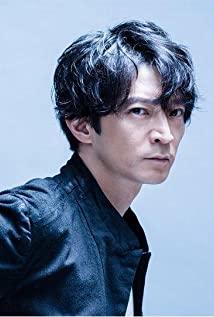"Yiyi" is a group-like movie, there is no so-called protagonist, and each Individuals are also protagonists, living in Taipei, and possibly in any metropolis in this world. 173 minutes flow slowly in director Yang Dechang's 35mm film, delicate and gentle, restrained and restrained. It begins with a wedding feast and ends with a funeral. It is like a condensed portrait of life.
As the standard bearer of Taiwan's new wave films, Yang Dechang has created a large number of highly ideological works through his penetrating observation and keen thinking on life and social reality. Yang Dechang passed away in June this year. To commemorate this film master, I revisited my favorite Chinese-language film. The grand narrative reveals the vicissitudes of life and humanistic care everywhere, which makes me lament the audience. with thinking.
Regarding the title of the film, there are different opinions. Yang Dechang himself explained: "One and one" is the beginning, and when you turn to the first page of the dictionary, one is one, and when the two characters of "one one" are written vertically, "one one" becomes " two". This is what Lao Tzu said: "Tao gives birth to one, one gives birth to two, two gives birth to three, and three gives birth to all things." The English translation of "One One" is called "A One & A Two". I think this is about the relationship between individuals and individuals. Thinking - the so-called "two in one life", and finally return to thinking about the issue of individual birth, old age, sickness and death - the so-called "two to one".
"One": The Lost of Individuals
The characters in the film first exist as individuals, possess private space, and constantly interact with other people; the individuals in "One One" are confused, for all kinds of trivial matters in life. Yang Dechang's camera is always behind a door, watching and recording coldly, as if searching for the answer to life for them.
NJ is a man who has encountered a mid-life crisis. The company is about to close down. He wants to grab the last straw. He has no intention of caring for his family. In the movie, NJ said, "You can pretend to be sincere, you can pretend to be honest, you can pretend to make friends, you can pretend to do business, then what else is true in this world?" Does everyone live with a mask and play the role in life? All kinds of characters, sincerity and honesty may be intriguing behind, friends may be treachery; it seems that you can withdraw from the role at any time, but in the end, you get too deep into the play and fall into an involuntary predicament. Playing it proficiently, I forgot whether it was drama or life, so I couldn't even tell the difference between the real and the fake. This kind of hypocrisy has become a habit and has become numb. And Yang Dechang is the one who dares to tell the truth, tearing people's masks through NJ's mouth. But NJ didn't have the ability to resist, just escaped, turned off all communication devices, and stayed at home all day without going to work, but such passive resistance was useless and powerless. I remember one of the episodes. After Adi was accidentally poisoned by gas, NJ went to visit, but the company contacted NJ through Adi's BP machine. It was impossible for him to escape the reality of wearing a mask.
Mrs. Minmin felt that the day was like this every day, and the repetition was monotonous, so she put aside everything and went to the mountain to devote herself to practicing Buddhism, looking for spiritual comfort. However, when she came back, she felt that the days had not changed. This is an externalized manifestation of the latent psychology of modern urbanites. Everyone may face a lot of pressure, so that they can’t breathe and try to escape; they hate life for the same thing, and they are uncertain about the future. Helped, lost, looking for sustenance in an attempt to anesthetize himself, but after waking up to find that life is still the same, it is hopeless. At the turn of the century, such apprehension is more common, and loss and search have become a common proposition for urbanites.
Brother-in-law and brother-in-law always clamored to pay NJ back, but the money he took to invest was deceived. The two women in life also fought several times. A Di is another representative of modern people. He is fascinated by money and material desires, and he also loses himself. He can't see the truth of life and the true value of life. There is a clever arrangement in the film. Adi takes a bath after being drunk and almost died from inhaling a lot of gas. It turns out that life may be fleeting, and money is nothing in comparison.
Daughter Tingting begins to fall in love with her best friend's lover "Fat Man", but it ends in a brutal juvenile violence incident. The first love is pure and fragile, the hand gently held when crossing the road, the kiss under the viaduct, everything is so beautiful, and finally Tingting finds out that she is just a substitute for a good friend, this youth love song is so fragile.
My son Yangyang is often bullied by girls and is obsessed with photographing the backs of other people's heads with cameras. This characterful little boy is the highlight of the whole film, and he is also Yang Dechang's spokesperson in the film. His casual behavior and words reveal the true meaning of life. When he photographed mosquitoes with a camera, he tried to tell people the truth that "hearing is false, seeing is believing", to expel rumors and pursue the truth; when he fell in love with a girl, secretly observed her, and hid in the bathroom to practice holding his breath after returning home, He also mustered up the courage to jump into the swimming pool. When I was worried about the silence of the swimming pool, he returned home soaked wet. At this time, I couldn't help but smile. It turned out that Yangyang still gave us hope of love.
NJ's mother-in-law had a stroke and was bedridden and did not wake up in the world. On the contrary, she was the most "awake" character in the whole film. Bystanders observed the lives of the family members and listened to their stories to understand the confusion and pain in their hearts. In the face of mother-in-law, everyone is like looking in a mirror, reflecting the emptiness and distress of spiritual life, there is no way to talk, or there is nothing to talk about. At the end of the film, the mother-in-law miraculously wakes up, Tingting snuggles in her mother-in-law's arms, and gets relief, but when she wakes up, her mother-in-law has passed away, I don't know if it's a dream or reality.
"Two": the alienation of the relationship
"One" and "One" are simply superimposed to produce "two", which inevitably creates gaps, which is the estrangement between individuals. In today's increasingly developed communication, the distance between people has not narrowed, but on the contrary, it has become farther and farther. People are used to communicating through e-mail or text messages, but it has become the reduction of words and face-to-face exchanges. In reinforced concrete cities, people are accustomed to the life of "two points and one line", shuttling through crowded streets and closed subways, and the dull and depressing life makes interpersonal relationships more and more alienated.
In this aspect of image performance, Yang Dechang used 18 sets of special lenses, the camera deliberately shot through the glass window, the glass window reflected a layer of images, and this layer of images was naturally superimposed with the image behind the window. . Even if the two individuals in the film face each other, even if they share the same bed, they do not understand each other's feelings. Everyone's heart seems to have such a piece of glass, which blocks the other's sight and also blocks the relationship between the two. Glass represents a barrier to communication between individuals, resulting in the alienation of relationships due to lack or lack of communication.
The estrangement between NJ and his wife is obvious. He is usually relatively silent and does not talk to each other about the troubles in life. Even if his wife went to the mountain to practice, NJ did not feel the lack of life; then, facing his first love, Sherry, NJ broke through the relationship between husband and wife. Layers of Fragile Relationships - "I've Never Loved Another Person Except You".
The two love scenes of NJ and Sherry, Tingting and Fatty are cross-edited, forming a kind of contrast. Tingting's first love is very similar to her father's, holding hands for the first time, escaping after going to the hotel for the first time, and finally parting, the same faint sweetness and green pain; however, NJ and Sherry's old dream revisited, a little more The heaviness of middle age and the impulsive youth can never be returned. The reason for the breakup of the first love has always blocked the two. Even if it is clear, the burden of the family still does not allow NJ to choose the ending together. This parallel montage method corresponds the youth story of Taipei with the falling flowers and waters of Tokyo, and the sourness of love is vivid and vivid.
The most surprising, the only group of characters in the communication is NJ and Daejeon, two foreigners. They communicate in English, talk about music, life, but not about business. Although the two have known each other for a while, they are like close friends. Daejeon seems to be the shadow of NJ. He is equally pure and frank, and bears silently on life. When the company called NJ in Tokyo to ask him to stop the business negotiation with Daejeon, NJ yelled loudly on the other end of the phone: "What are you doing? Daejeon is a good man if he can do this!" There are no good and bad people in business, I think NJ's bookishness is just defending himself, an honest man, venting the feeling of being fooled by others and the pain of betraying his friends. In the noisy bar, the two played the piano and sang quietly, so the tacit understanding was beautiful.
Regarding the aphasia of communication and the alienation of relationships, I think of two other movies with the same theme - "Crash" and "Babel", and "Yiyi" is different from the multi-paragraph narratives of these two films, his huge The narrative comes from the most simple and ordinary life, stable, without strong conflicts between ethnic groups and races, and without the confusion of cultural differences. Yang Dechang does not attract attention with spectacle-style plots, there are no particularly big ups and downs, and everything is bland. When watching the film, I feel that I am also living a life. When the final funeral is held, the moment the music sounds, I can't help feeling sad and desolate. This is the strength of life conveyed by the film, and life itself is enough to shake people's hearts.
"One": Individual Thinking
The film tells the story of a family. As the clues gradually become clear, the director shifts his perspective to the individual concerned, and thinks about the individual's living status and ultimate destiny.
Yang Dechang skillfully revealed the adult world through Yangyang's perspective, "Because you can't see it, I'll take a picture for you!" what. Can the eyes blinded by money and material desires truly discern the truth of the facts and the essence of life? In this world where it is difficult to distinguish between true and false, perhaps the world behind it is much more real and credible. Yangyang's attention to this "behind the head" world with more truth and less hypocrisy represents the director's reflection on the depths of human nature.
At the end of the film, at the funeral of the mother-in-law, Yangyang read out his confession to her mother-in-law like a little adult: "I don't know too many things, so do you know what I want to do in the future? I'm going to tell others that they don't. What you know, show others what they can't see. I think this must be fun every day. Maybe one day I will find out where you have gone. Can I tell you and ask everyone to come and see it together What about you? Mother-in-law, I miss you so much. Especially when I see that little cousin who doesn't have a name yet, I will think of you and always tell me: You are old. I really want to tell him that I think... I too old."
After reading this passage, I thought of a song by Eason Chan: "I was already old when I first gave birth, and I couldn't catch up with the wings at the beginning. When the dominoes were leaked, I knew that every day forced me to go on the road, every day forced me to improve, it was difficult. Avoid getting involved in the times, it's too scary." Yangyang's remarks are depressing, the eight-year-old child feels that he has begun to grow old, such a shocking contrast! It is conceivable that the life born in this era is so helpless, birth, old age, sickness and death are inevitable, but they come so quickly. I don’t know when Yangyang’s innocent dreams will be defeated by reality, and when Yangyang’s quest for truth with a camera will be smoothed out by the adult world, I think it’s just like the song sings, it’s hard for people not to get involved In the giant wheel of the times, will the future Yangyang become another NJ or Adi? The result of human beings created by the environment is unpredictable...
Yang Dechang entrusted the task of exploring the truth of life to a childish child with a light weight. Even if it ends in death, there are still piano accompaniment, sunshine, green trees one after another, no deep sadness and melancholy, and some are just epiphanies unique to Yangyang...
View more about Yi Yi: A One and a Two... reviews


